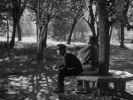Eye For Film >> Movies >> Kokoro (1955) Film Review
Ichikawa Kon, the prolific Japanese director best known for The Burmese Harp (1956), An Actor's Revenge (1963) and Tokyo Olympiad (1965), helms this impeccable period drama in which secrets are kept, lies are told and desires are tragically repressed. Think Brokeback Mountain (2005), only made half a century earlier and set in the late Meiji period.
It is April 1912, a few months before the death of the ailing Emperor Meiji, and Nobuchi (Mori Masayuki) is also living his life like a dead man. Tormented, unhappy and introverted, he is suspected by his wife Shizu (Aratama Michiyo) of having an affair – but, in fact, he merely divides his time between reclusive research at home and morbid visits to the grave of his old friend Kaji (Mihashi Tatsuya), while bearing the burden of an unbearable secret. Befriended and idolised by university student Hioko (Yasui Shoji), Nobuchi begins slowly to open up about his past, in the hope of bequeathing to the younger man a different future for the coming era.

Not that we ever find out if the truth will set Hioko free, but at least there is a glimmer of hope at the end of Kon's otherwise bleak drama. Based on the 1914 novel of the same name by acclaimed author Natsume Soseke, Kokoro begins with a mystery (what is Nobuchi's long-buried secret?), then unravels layer upon layer of shame, guilt and repression through a series of fluid flashbacks to Nobuchi's student days with Kaji and Shizu.
The final revelation is divulged (in a letter) to Hioko alone, and withheld from us – but that is only because Kon is too sophisticated a director to state the obvious, preferring instead to encode a decade and a half of forbidden yearning into every glance, gesture and frame of this exquisitely crafted film.
Reviewed on: 28 Feb 2009





















